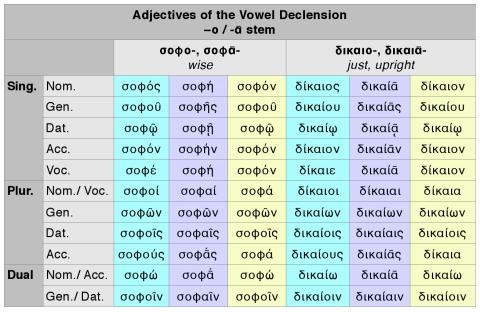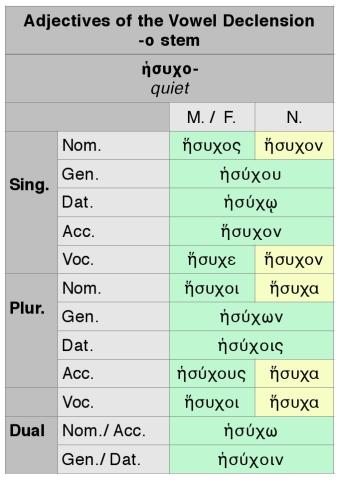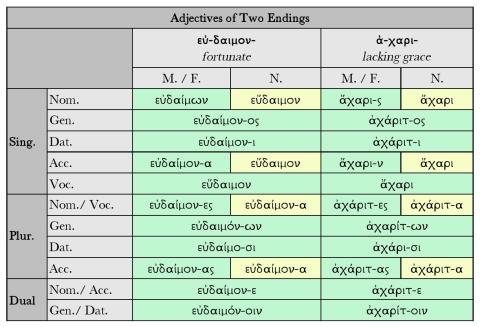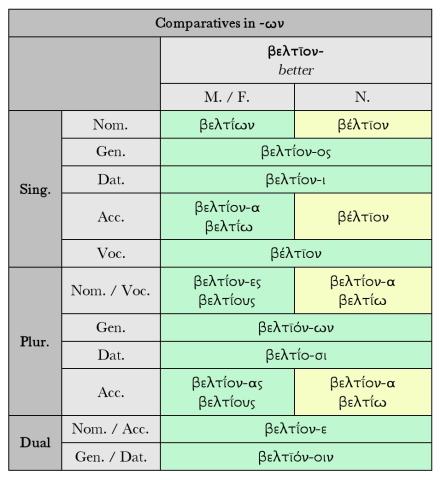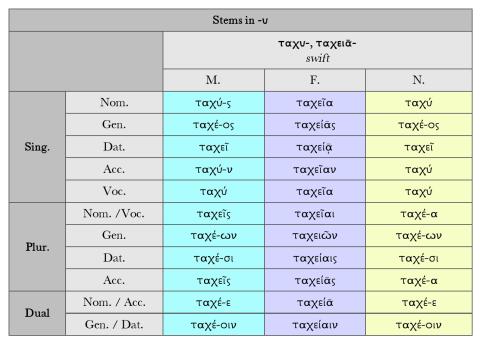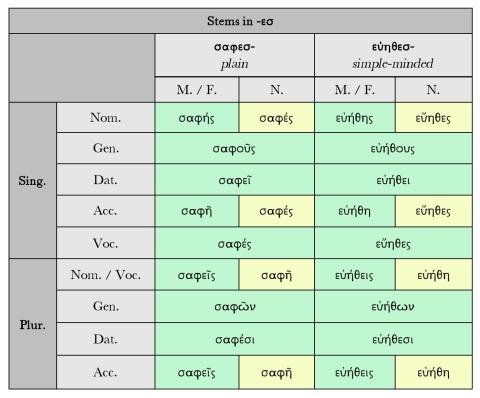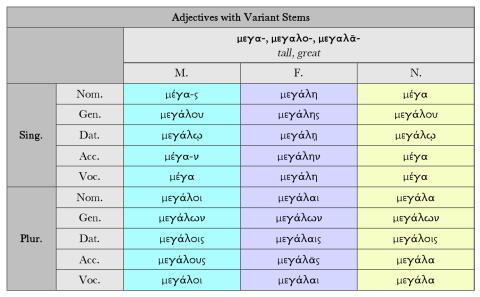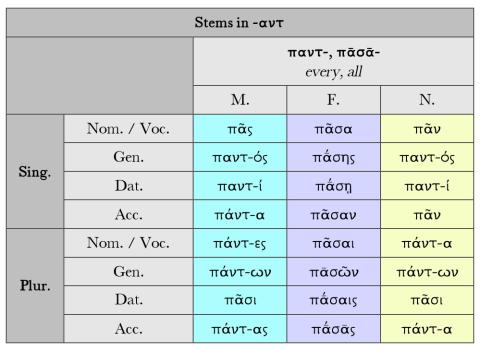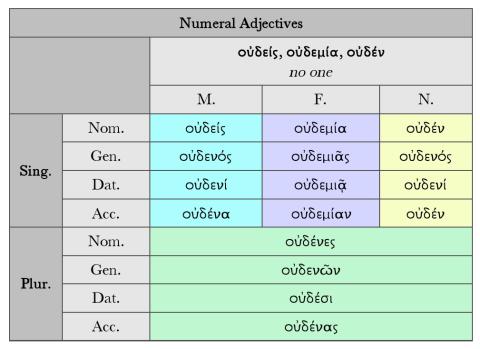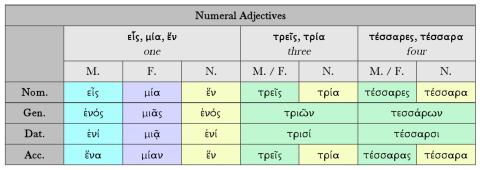1a. ἐγγὺς Ἰταλίας κεῖται ἡ Σικελία, νῆσος εὐδαίμων καὶ πολυάνθρωπος.
1b. βραχὺς ὁ βίος, ἡ δὲ τέχνη μακρά.
1c. βραχεῖα τέρψις ἡδονῆς κακῆς.
1d. κέρδος αἰσχρὸν βαρὺ κειμήλιον.
1e. τὸ μέλλον ἀσαφές.
1f. κακῆς ἀπ’ ἀρχῆς γίγνεται τέλος κακόν.
1g. τὸν ἀμαθῆ πλούσιον Διογένης πρόβατον εἶπε χρυσόμαλλον.
2a. τυραννὶς χρῆμα μὲν σφαλερὸν, πολλοὶ δὲ αὐτῆς ἐρασταί εἰσιν.
2b. τυφλὸν ὁ πλοῦτος.
2c. πιστὸν ἡ γῆ, ἄπιστον ἡ θάλασσα.
2d. καλὸν ἡσυχία.
2e. καλὸν ἡ ἀλήθεια καὶ μόνιμον.
2f. τὰ μέγαλα δῶρα τῆς τύχης ἔχει φόβον,
καὶ τὸ πάνυ λαμπρὸν οὐκ ἀκίνδυνον κυρεῖ,
οὐδ’ ἀσφαλὲς πᾶν ὕψος ἐν θνητῷ γένει.
3a. κρεῖττόν ἐστι μετ’ ὀλίγων ἀγαθῶν πρὸς ἅπαντας τοὺς κακοὺς, ἢ μετὰ πολλῶν κακῶν πρὸς ὀλίγους ἀγαθοὺς μάχεσθαι.
3b. οὐδὲν ὀργῆς ἀδικώτερον.
3c. πόλεμος ἔνδοξος εἰρήνης αἰσχρᾶς αἱρετώτερος.
3d. Βίων ἔφη, δεῖν τὸν ἀγαθὸν ἄρχοντα, παυόμενον τῆς ἀρχῆς, μὴ πλουσιώτερον, ἀλλ’ ἐνδοξότερον γεγονέναι.
3e. οὐδὲν κτῆμα σοφίας τιμιώτερόν ἐστιν.
3f. σοφία πλούτου κτῆμα τιμιώτερον.
3g. παρὰ Ταρτησσίοις νεωτέρῳ πρεσβυτέρου καταμαρτυρεῖν οὐκ ἔξεστιν.
3h. δόξα ἀσθενὴς ἄγκυρα, πλοῦτος ἔτι ἀσθενεστέρα.
3i. ἀρετῆς οὐδὲν χρῆμα σεμνότερον, οὐδὲ βεβαιότερόν ἐστιν.
4a. πολλὰ τῶν ζώων ἄναιμά ἐστι, καθόλου δὲ, ὅσα πλείους πόδας ἔχει τεττάρων.
4b. χαλεπὸν τὸ ποιεῖν, τὸ δὲ κελεῦσαι ῥᾴδιον.
4c. οὐδὲν γλύκιον τῆς πατρίδος.
4d. οὐκ ἔστιν οὐδὲν μητρὸς ἥδιον τέκνοις.
4e. κρείσσων οἰκτιρμοῦ φθόνος.
4f. χρὴ σιγᾶν, ἢ κρείσσονα σιγῆς λέγειν.
4g. διὰ τοῦτο δύο ὦτα ἔχομεν, στόμα δὲ ἓν, ἵνα πλείω μὲν ἀκούωμεν, ἥττονα δὲ λέγωμεν.
4h. τὸ κενὸν ἐν τῷ βίῳ πλεῖόν ἐστι τοῦ συμφέροντος.
4i. ἄρχε σαυτοῦ μηδὲν ἧττον ἢ τῶν ἄλλων.
4j. στέργε μὲν τὰ παρόντα, ζήτει δὲ τὰ βελτίω.
4k. οἱ τῶν τελετῶν μετέχοντες περὶ τῆς τοῦ βίου τελευτῆς ἡδίους τὰς ἐλπίδας ἔχουσιν.
5a. ὁ μέλας οἶνός ἐστι θρεπτικώτατος, ὁ δὲ λευκὸς, λεπτότατος.
5b. ἡ Βακτριανὴ χώρα εὐδαιμονεστάτη ἐστὶ καὶ εὐφορωτάτη.
5c. πρεσβύτατον τῶν ὄντων θεός· ἀγέννητος γάρ·
κάλλιστον κόσμος· ποίημα γὰρ θεοῦ·
μέγιστον τόπος· πάντα γὰρ χωρεῖ·
τάχιστον νοῦς· διὰ παντὸς γὰρ τρέχει·
ἰσχυρότατον ἀνάγκη· κρατεῖ γὰρ πάντων·
σοφώτατον χρόνος· ἀνευρίσκει γὰρ πάντα.
5d. ὁ κροκόδειλος ἐξ ἐλαχίστου γίγνεται μέγιστος· τὸ μὲν γὰρ ὠὸν οὐ μεῖζόν ἐστι χηνείου, αὐτὸς δὲ γίγνεται καὶ ἑπτακαιδεκάπηχυς.
5e. ὁ τῶν πλείστων βίος μελλησμῷ παραπόλλυται.
5f. κάλλιστον τὸ δικαιότατον· λῷστόν θ’ ὑγιαίνειν,
ἥδιστον δὲ τυχεῖν ὧν τις ἕκαστος ἐρᾷ.
5g. ὁ θάνατος κοινὸς καὶ τοῖς χειρίστοις καὶ τοῖς βελτίστοις· οὔτε τοὺς πονηροὺς ὑπερορᾷ, οὔτε τοὺς ἀγαθοὺς θαυμάζει.
6a. ἡ γῆ σφαιροειδής ἐστι καὶ ἐν μέσῳ κεῖται.
6b. οἱ πλούσιοι πολλάκις ὑφ’ ἡδονῆς διηνεκοῦς οὐ συνίενται τῆς εὐτυχίας.
6c. Ἐπαμινώνδας πατρὸς ἦν ἀφανοῦς.
6d. πάντα ἐκ τῆς ἐπιμελείας, καὶ τῆς διαρκοῦς φροντίδος, καὶ τῆς σπουδῆς τῆς ἀνελλιποῦς κρείττονα γίγνεσθαι δύναται.
6e. Ὅμηρος τοῖς ἥρωσιν ἁπλῆν καὶ πᾶσιν ὅμοιαν δίαιταν ἀποδέδωκε.
6f. Διονύσιος ὁ τύραννος τὸ Ἀπόλλωνος ἄγαλμα περιεσύλησε, χρυσοῦς βοστρύχους ἔχον, καὶ τὴν παρακειμένην αὐτῷ χρυσῆν τράπεζαν ἀφεῖλεν.
6g. Σωκράτης ἰδὼν μειράκιον πλούσιον καὶ ἀπαίδευτον, ἰδοὺ, ἔφη, χρυσοῦν ἀνδράποδον.
7a. τὰ ὄρη πόρρωθεν ἀεροειδῆ φαίνεται καὶ λεῖα, ἐγγύθεν δὲ τραχέα.
7b. οὐ κρεῖττον, πενιχρὸν μὲν, ἀσφαλῆ δὲ καὶ ἀδεᾶ βίον ἀσπάσασθαι, ἢ πλούσιον καὶ ἐπικίνδυνον;
7c. Ἐλευθέρου ἀνδρός ἐστιν, ἀεὶ τἀληθῆ λέγειν.
7d. Νικοκρέων ὁ Κύπριος τετράκερων ἔλαφον εἶχεν.
7e. ἐν τινι ναῷ Διὸς τρίκερω καὶ τετράκερω πρόβατα ἦν.
7f. Ἀριστοτέλης ἔφη, τῆς παιδείας τὰς μὲν ῥίζας εἶναι πικρὰς, γλυκεῖς δὲ τοὺς καρπούς.
7g. τρεῖς εἰσι δικασταὶ καθ’ ᾅδου, οἳ τοὺς εὐσεβεῖς καὶ πονηροὺς διακρίνουσιν.
7h. δεινόν ἐστι τοὺς χείρους τῶν βελτιόνων ἄρχειν.
8a. Ἀνάχαρσις κρεῖττον ἔλεγεν, ἕνα φίλον ἔχειν πολλοῦ ἄξιον, ἢ πολλοὺς μηδενὸς ἀξίους.
8b. ἡ μυῖα, ἑξάπους οὖσα, τοῖς μὲν τέσσαρσι βαδίζει μόνοις, τοῖς δὲ προσθίοις δυσὶ ὡς χερσὶ χρῆται.
8c. Πύρρος ἐν Ἰταλίᾳ ἐπολέμησεν ἔτη δύο καὶ μῆνας τέσσαρας.
8d. Φίλήμων ὁ κωμικὸς ἔγραψε δράματα ἑπτὰ καὶ ἐννενήκοντα, βιώσας ἔτη ἐννέα καὶ ἐννενήκοντα.
8e. Ἄννων, ὁ πρεσβύτερος, ἐκ τῆς Λιβύης ἐπέρασε μεγάλην δύναμιν εἰς Σικελίαν, πεζῶν μυριάδας πέντε, ἱππεῖς δὲ ἑξακισχιλίους, ἐλέφαντας δὲ ἑξήκοντα.
8f. τοὺς Σῆρας ἱστοροῦσι μέχρι τριακοσίων ζῆν ἐτῶν, καὶ τοὺς Χαλδαίους ὑπὲρ τὰ ἑκατὸν ἔτη βιοῦν λόγος.
9a. Ἀργανθώνιος, ὁ Ταρτησσίων βασιλεὺς, πεντήκοντα καὶ ἑκατὸν ἔτη βιῶσαι λέγεται.
9b. Κτησίβιος συγγραφεὺς ἑκατὸν εἰκοσιτεσσάρων ἐτῶν ἐν περιπάτῳ ἐτελεύτησεν.
9c. ὁ Πλάτων ἐτελεύτησε τῷ πρώτῳ ἔτει τῆς ὀγδόης καὶ ἑκατοστῆς Ὀλυμπιάδος, βιοὺς ἔτος ἓν πρὸς τοῖς ὀγδοήκοντα.
9d. Σιλουΐου ἑνὸς δέοντα τριάκοντα ἔτη βασιλεύσαντος, Αἰνείας, υἱὸς αὐτοῦ, ἑνὶ πλείω τριάκοντα ἐτῶν τὴν δυναστείαν εἶχεν.
9e. οἱ Λακεδαιμόνιοι τοῖς Ἀθηναίοις βοηθήσοντες ἐν τρισὶν ἡμέραις καὶ τοσαύταις νυξὶ διακόσια καὶ χίλια στάδια διῆλθον.
notes
- First-second declension adjectives: G. 74 and 76.
- Third declension adjectives: G.147, 149, 151, 158, 160, 175, 189.
-
Comparatives and superlatives: G. 177-184.
1a. κεῖται: 3rd sing. pres. ind. > κεῖμαι (G. 387)
εὐδαίμων: nominative singular feminine, agreeing with νῆσος. G. 147.
πολυάνθρωπος: nominative singular feminine, agreeing with νῆσος. Declines like ἥσυχος -ον: G. 74.
1b. βραχὺς ὁ βίος: "life is short," supply ἐστί. This is a saying attributed to the famous Greek doctor Hippocrates, indicating the extended effort needed to master any art, such as medicine. βραχὺς declines like ταχύς: G. 158.
1c. τέρψις: the order is, τέρψις ἡδονῆς κακῆς (ἐστὶ) βραχεῖα.
1d. κέρδος αἰσχρὸν, etc.: supply ἐστί.
βαρὺ: declines like ταχύς: G. 158.
1e. τὸ μέλλον ἀσαφές: supply ἐστί. μέλλον is the present active participle > μέλλω, "to be about to (happen)." The article makes the participle into a noun, "the (thing) about to happen," i.e., "the future." See LSJ μέλλω IV.
ἀσαφές: neuter nominative singular, declines like σαφής σαφές: G. 151.
1f. γίγνεται: “arises,” more literally, “is produced."
1g. τὸν ἀμαθῆ πλούσιον: "the ignorant rich man," i.e., him who was rich but uneducated.
ἀμαθῆ: masculine accusative singular, declines like σαφής σαφές: G. 151.
Διογένης: Diogenes of Sinope aka Diogenes the Cynic, known for his caustic critiques of conventional morality. The quotation come from Diogenes Laertius, Lives of the Eminent Philosophers, Book 7, ch. 47.
εἶπε: “used to call."
2a. χρῆμα μὲν σφαλερὸν: “is an insecure thing,” supply ἐστί.
δὲ: “and yet."
εἴσιν: “are,” 3rd pl. pres. ind. > εἰμί.
2b. τυφλὸν ὁ πλοῦτος: the order is, ὁ πλοῦτος (ἐστὶ) τυφλὸν χρῆμα.
2d. καλὸν ἡσυχία: “quiet is a pleasing thing.”
2f. μέγαλα: neuter plural nominative > μέγας μεγάλη μέγα: G. 175.
ἔχει φόβον: “carry with them fear," literally, “have fear,” i.e., connected with them.
ἔχει: 3rd sing. pres. indic. act. > ἔχω.
τὸ πάνυ λαμπρὸν: “whatever is very dazzling,” more literally, “the thing that is very brilliant."
κυρεῖ: equivalent here to ἐστί; 3rd sing. pres. indic. act. > κυρέω.
Οὐδ’ ἀσφαλὲς, etc.: “nor is every elevated situation among mankind a secure one," supply ἐστί.
ἀσφαλὲς: neuter nominative singular, agreeing with ὕψος, declines like σαφής σαφές: G. 151.
3a. μετ’ ὀλίγων ἀγαθὼν: “along with a few brave men."
μετ’: > μετά.
ἅπαντας: acc. pl. masc. > ἅπας.
κακοὺς: “cowards.”
μάχεσθαι: pres. inf. > μάχομαι.
3b. Οὐδὲν ὀργῆς ἀδικώτερον: “nothing is more unjust than anger." The comparative degree with a gen.
3c. Πόλεμος ἔνδοξος, etc.: the order is, ἔνδοξος πόλεμος (ἐστὶν) αἱρετώτερος αἰσχρᾶς εἰρήνης.
3d. δεῖν τὸν ἀγαθὸν ἄρχοντα, etc.: “that a good magistrate ought, on ceasing from his magistracy."
παυόμενον: pres. part. mid. > παύω.
γεγονέναι: “to be,” perf. inf. mid. > γίνομαι.
3f. Σοφία: supply ἐστί.
3g. νεωτέρῳ πρεσβυτέρου, etc.: the order is, οὐκ ἔξεστι νεωτέρῳ καταμαρτυρεῖν πρεσβυτέρου, “it is not permitted a young person to bear testimony against an elderly one," literally, “it is not lawful for a younger to testify against an older person."
καταμαρτυρεῖν: pres. inf. act. > καταμαρτυρέω, the preposition κατά here, in composition, governs the gen.
4a. Πολλὰ τῶν ζώων: “many animals,” literally, “many of animals.” The neut. pl. πολλὰ has the verb (ἐστί) in the sing.
ὅσα ἔχει: “as many as have,” neut. plur. with a sing. Verb.
ὅσα: > ὅσος.
πλείους: acc. pl. > πλείονας, comparative > πολύς, taking τεττάρων in the gen.
4b. τὸ ποιεῖν: “the doing a thing,” nom. to ἐστί understood. The inf. with the neut. of the article forms in Greek a species of verbal noun. So again, τὸ κελεῦσαι, "the ordering a thing."
ποιεῖν: pres. inf. act. > ποιέω.
κελεῦσαι: 1st aor. inf. act. > κελεύω.
4c. γλύκιον: comparative > γλυκύς.
τῆς πατρίδος: "than one’s country."
4d. Οὐκ ἔστιν οὐδὲν: “there is nothing.” Two or more negatives in Greek make a stronger negation.
4e. Κρείσσων οἰκτιρμοῦ φθόνος: "envy is better than compassion," i.e., it is better to be envied for brilliant success, than to be pitied for want of spirit to achieve.
κρείσσων: irreg. comparative > ἀγαθός.
4f. Χρὴ: "we ought," impersonal verb.
σιγᾶν: pres. inf. act. > σιγάω.
ἤ: "or else."
κρείσσονα σιγῆς: "things better than silence." i.e., things more or less important in their nature, and therefore worthy of mention.
4g. ὦτα: "ears," acc. pl. > οὖς.
ἔχομεν: 1st pl. pres. ind. act. > ἔχω.
ἕν: acc. sing. neut. > εἵς, μία, ἕν.
ἵνα πλεῖω μὲν ἀκούωμεν, etc.: "in order that we may hear more and say less."
πλείω: acc. pl. neut. comparative > πολύς.
ἀκούωμεν: 1st pl. pres. subj. act. > ἀκούω.
ἥττονα: acc. pl. neut. > ἥττων, irreg. comparative of μικρός.
λέγωμεν: 1st pl. pres. subj. act. > λέγω.
4h. πλειόν ἐστι: "is more abundant."
συμφέροντος: "than the useful," literally, "than that which is advantageous"; gen. sing. pres. part. act. > συμφέρω.
4i. Ἄρχε: "govern," 2nd sing. pres. imperat. act. > ἄρχω. Governs the gen., as being equivalent to a noun and verb.
μηδὲν ἧττον: "no less."
4j. Στέργε: “love,” i.e., “cherish a regard for”; 2nd sing. pres. imperat. act. > στέργω.
τὰ παρόντα: “what you at present have,” literally, “the things present unto you,” acc. pl. neut. pres. part. > πάρειμι
ζήτει δὲ τὰ βελτίω: “and yet at the same time seek after better things."
ζήτει: 2nd sing. pres. imperat. act. > ζητέω.
βελτίω: acc. pl. neut. > βελτίων, comparative of ἀγαθός.
4k. Οἱ τῶν τελετῶν, etc.: The order is, οἱ μετέχοντες τῶν τελετῶν ἔχουσιν τὰς ἐλπίδας ἡδίους περὶ τῆς τελευτῆς τοῦ βίου, “they who participate in the mysteries have more pleasing hopes respecting the end of life,” i.e., the initiated have more cheering hopes respecting a future state, than the uninitiated.
μετέχοντες: pres. part. act. > μετέχω, governing the partitive gen. gen. as indicating the taking part in a thing.
ἡδίους: acc. pl. > ἡδίων, comparative of ἡδύς.
5c. τῶν ὄντων: “of the things that are,” i.e., of all things; gen. pl. pres. part. > εἰμί, agreeing with χρημάτων understood, just as πρεσβύτατον agrees with χρῆμα, also understood.
ἀγέννητος γάρ: "for he is uncreated."
κάλλιστον κόσμος: "the world is the fairest,” i.e., the fairest thing of the things that are, τῶν ὄντων understood.
μέγιστον τόπος: “space is the most extensive."
χωρεῖ: 3rd sing. pres. ind. act. > χωρέω.
τρέχει: 3rd sing. pres. ind. act. > τρέχω.
κρατεῖ: 3rd sing. pres. ind. act. > κρατέω, and governing the gen. as equivalent to κράτος ἔχει, a noun and verb.
ἀνευρίσκει: “it finds out,” 3rd sing. pres. ind. act. > ἀνευρίσκω.
5d. γίγνεται: “becomes,” 3rd sing. pres. ind. mid. > γίγνομαι.
τὸ μὲν γὰρ ὠὸν: “for its egg,” more literally, “for the egg (that contains it)."
χηνείου: “than that of a goose,” agreeing with ὠοῦ understood.
καὶ ἑπτακαιδεκάπηχυς: “even seventeen ells long,” literally, “of seven and ten ells in length."
5e. Ὁ τῶν πλείστων, etc.: the order is, ὁ βίος τῶν πλείστων παραπόλλυται μελλησμῷ.
παραπόλλυται: “is ruined,” i.e., is blasted in its fairest prospects; 3rd sing. pres. ind. pass. > παραπόλλυμι.
5f. Κάλλιστον τὸ δικαιότατον, etc: “what is most just is fairest; to enjoy health, too, is easiest; and it is most pleasing to obtain the things which each one loves,” i.e., which he desires to obtain.
ῥᾷστόν θ’: for ῥᾷστόν τε: the final vowel of τε being cut off by apostrophe and the consonant changed to an aspirate.
ῥᾷστον: superlative of ῥᾴδιος.
ὐγιαίνειν: pres. inf. act. > ὑγιάινω, taken as a noun (in prose it would be τὸ ὐγιαίνειν) with ἐστί understood.
τυχεῖν: 2nd aor. inf. act. > τυγχάνω, governing τούτων ("those things") understood.
ὧν: gen. plur. neut. > ὅς, ἥ, ὅ.
ἐρᾷ: 3rd sing. pres. ind. act. > ἐράω, governing the gen.
5g. χειρίστοις: dat. pl. masc. > χείριστος, irreg. superlative > κακός.
βελτίστοις: dat. pl. masc. > βέλτιστος, irreg. superlative > ἀγαθός.
ὑπερορᾷ: 3rd sing. pres. ind. act. > ὑπεροράω.
οὔτε τοὺς ἀγαθοὺς θαυμάζει: "nor spares, through admiration, the good."
θαυμάζει: 3rd sing. pres. ind. act. > θαυμάζω.
6a. καὶ ἐν μέσῳ κεῖται: “and lies in the center of the universe.” The popular but erroneous belief of an early period. With μέσῳ supply τόπῳ or something equivalent.
6b. ὑφ’ ἡδονῆς διηνεκοῦς: “through long-continued pleasure," i.e., through uninterrupted enjoyment, and the satiety which this produces.
οὐ συνίενται, etc.: "do not comprehend true felicity," i.e., have no conception of what forms true happiness.
συνίενται: 3rd pl. pres. ind. mid. > συνίημι, governing the gen.
6c. πατρὸς ἦν ἀφανοῦς: "was the son of an obscure father," supply ὁ υἱός after ἦν.
6d. ἐκ τῆς ἐπιμελείας: “through care."
γίγνεσθαι δύναται: “are able to become," i.e., can become, or can be rendered.
6e. τοῖς ἥρωσιν: “unto his heroes,” i.e., those described in his poems.
πᾶσιν ὅμοιαν: “of the same kind for all."
ἀποδέδωκε: “has assigned," 3rd sing. perf. ind. act. > ἀποδίδωμι.
6f. περιεσύλησε: "despoiled," 3rd sing. 1st aor. ind. act. > περισυλάω.
παρακειμένην αὐτῷ: “lying by the side of it,” i.e., placed by the side of it. The dat. αὐτῷ is governed by παρά in composition.
ἀφεῖλεν: "took away," 3rd sing. 2nd aor. ind. act. > ἀφαιρέω.
6g. ἰδὼν: 2nd aor. part. act. > ὁράω.
καὶ ἀπαίδευτον: “and at the same time uneducated.”
7a. φαίνεται: "appear," 3rd sing. pres. ind. mid. > φαίνω, sing. verb with a neut. pl.
7b. Οὐ κρεῖττον: "is it not better?" Supply ἐστί.
ἀσπάσασθαι: “to choose,” more literally, “to embrace”; 1st aor inf. mid. > ἀσπάζομαι.
7c. ἐλευθέρου ἀνδρός ἐστιν: “it is the duty of a free man," i.e., of a free spirit.
τἀληθῆ: “the truth,” contraction > τὰ ἀληθῆ.
7d. εἶχεν: 3rd sing. imperf. ind. act. > ἔχω.
7f. ἔφη: "used to say," 3rd sing. imperf. ind. act. > φημί.
ῥίζας: acc. with infinitive (εἶναι).
7g. καθ’ ᾅδου: "in Hades."
καθ’: =κατά.
διακρίνουσιν: "discriminate between," 3rd pl. pres. ind. act. > διακρίνω.
7h. δεινόν ἐστι, etc.: "it is a dreadful thing for the bad to rule over the good,” more literally, “for the worse to rule over the better."
χείρους: acc. before the inf., irreg. comparative > κακός.
ἄρχειν: pres. inf. act. > ἄρχω.
8a. ἔλεγεν: 3rd sing. imperf. ind. act. > λέγω.
κρεῖττον: “that was better,” supply εἶναι.
8b. ἑξάπους οὖσα: "being six-footed."
οὖσα: nom. sing. fem. > ὤν, οὖσα, ὄν, pres. part. > εἰμί.
τοῖς μὲν τέσσαρσι, etc.: “walks on only four:"
βαδίζει: 3rd sing. pres. ind. act. > βαδίζω.
χρῆται: 3rd sing. pres. ind. > χράομαι.
8c. ἐπολέμησεν: 3rd sing. 1st aor. ind. act. > πολεμέω.
ἔτη: time how long, and therefore in the acc. extent of time.
8d. ἔγραψε: 3rd sing. 1st aor. ind. act. > γράφω.
βιώσας: “having lived,” i.e., during a life of; 1st aor. part. act. > βιόω.
8e. ὁ πρεσβύτερος: “the elder."
ἐπέρασε: "transported," 3rd sing. 1st aor. ind. act. > περάω.
8f. Τοὺς Σῆρας ἱστοροῦσι, etc.: "they relate that the Seres live," etc.
ἱστοροῦσι 3rd pl. pres. ind. act. > ἱστορέω.
ζῆν: pres. inf. act. > ζάω.
καὶ τοὺς Χαλδαίους, etc.: “and there is a report that the Chaldaeans survive beyond 100 years."
ὑπὲρ τὰ ἑκατὸν ἔτη: The article is frequently joined, in Greek, to numerals, to mark the complete sum, where in English it is seldom expressed.
βιοῦν: pres. inf. act. > βιόω.
λόγος: supply ἐστί.
9a. βιῶσαι λέγεται: “is said to have lived.”
βιῶσαι: 1st aor. inf. act. > βιόω
λέγεται: 3rd sing. pres. ind. pass. > λέγω.
9b. συγγραφεὺς ἑκατὸν, etc.: “an historian of 124 years,” i.e., an historical writer, after having reached the age of 124 years.
ἐτελεύτησεν: 3rd sing. 1st aor. ind. act. > τελευτάω.
9c. βιοὺς: “after having lived,” 2nd aor. part. act. > βιόω.
ἔτος ἓν πρὸς, etc.; "eighty-one years," literally, “one year in addition to eighty."
9d. Σιλουΐου ἑνὸς, etc.: "Silvius having reigned thirty years wanting one.”
ἑνὸς: (ἔτους understood) governed by δέοντα.
δέοντα: pres. part. act. > δέω.
βασιλεύσαντος: gen. absolute, 1st aor. part. act. > βασιλεύω.
ἑνὶ πλείω τριάκοντα ἐτῶν: "for one year more than thirty."
9e. βοηθήσοντες: in order to lend aid,” fut. part. act. > βοηθέω.
διῆλθον: “traversed,” i.e., marched, literally, “went through”; 3rd pl. 2nd aor. indic. act. > διέρχομαι.
vocabulary
(1)
Σικελία -ας, ἡ: Sicily
πολυάνθρωπος -ον: populous
τέρψις -εως, ἡ: delight, enjoyment
κειμήλιον -ου, τό: treasure, heirloom
ἀσαφής -ές: unclear, indistinct
ἀμαθής -ές: ignorant
χρυσόμαλλον -ου, τό: golden-fleeced
(2)
τυραννίς -ίδος, ἡ: tyranny
σφαλερός -ά -όν: unstable, perilous
ἐραστής -οῦ, ὁ: lover
ἄπιστος -ον: untrustworthy
μονιμός -ή -όν: lasting, permanent
κυρέω, κυρήσω, ἐκύρησα: meet with, hit upon
(3)
παύομαι, παύσομαι, ἐπαυσάμην: cease, desist
ἐνδοξότερος -α -ον: more glorious
καταμαρτυρέω, καταμαρτυρήσω, κατεμαρτύρησα: testify against
κτῆμα -ατος, τό: possession
σοφία -ας, ἡ: wisdom
(4)
ἄναιμος -ον: bloodless
οἰκτιρμός -οῦ, ὁ: pity, compassion
τελετή -ῆς, ἡ: rite, initiation
σιγάω, σιγήσω, ἐσίγησα: be silent
συμφέρον -οντος, τό: advantage, benefit
(5)
θρεπτικός -ή -όν: nourishing
λεπτός -ή -όν: fine, subtle
Βακτριανή -ῆς, ἡ: Bactriana
εὔφορος -ον: fertile, productive
νόος (νοῦς) -οῦ, ὁ: mind
ἀνάγκη -ης, ἡ: necessity
ἀνευρίσκω, ἀνευρήσω, ἀνεῦρον: discover
κροκόδειλος -ου, ὁ: crocodile
ὠόν -οῦ, τό: egg
μελλησμός -οῦ, ὁ: procrastination
(6)
σφαιροειδής -ές: spherical
διηνεκής -ές: continuous
ἄφανος -ον: obscure, undistinguished
ἐπιμέλεια -ας, ἡ: care, attention
διάρκος -ος -ον: enduring, continual
ἀνελλιπής -ές: unceasing
βόστρυχος -ου, ὁ: lock of hair
παρακείμαι: lie beside, be nearby
τράπεζα -ης, ἡ: table
μειράκιον -ου, τό: youth, lad
ἀνδράποδον -ου, τό: slave (war captive)
(7)
ἀεροειδής -ές: misty, vaporous
τραχύς -εῖα -ύ: rough, rugged
πενιχρός -ά -όν: poor, scanty
ἀσφαλής -ές: safe
ἄδειος -ον: free from fear
τετράκερως -ων: four-horned
τρίκερως -ων: three-horned
ῥίζα -ης, ἡ: root
καρπός -οῦ, ὁ: fruit
βελτίων -ον: better (comp.)
(8)
Ἀνάχαρσις -εως, ὁ: Anacharsis
ἀνάξιος -ον: worthless
μυῖα -ης, ἡ: fly
ἑξάπους -ουν: six-footed
πρόσθιος -α -ον: forward, fore-
χειρ -ός, ἡ: hand
δρᾶμα -ατος, τό: drama, play
Ἄννων -ωνος, ὁ: Hanno
πεζός -οῦ, ὁ: foot-soldier
μυριάς -άδος, ἡ: ten thousand
ἐλέφας -αντος, ὁ: elephant
(9)
Ἀργανθώνιος -ου, ὁ: Arganthonius
Κτησίβιος -ου, ὁ: Ctesibius
περίπατος -ου, ὁ: walk, promenade
Ὀλυμπιάς -άδος, ἡ: Olympiad
δυναστεία -ας, ἡ: dynasty, reign
διέρχομαι, διελεύσομαι, διῆλθον: go through, traverse
στάδιον -ου, τό: stadion (unit of length)

